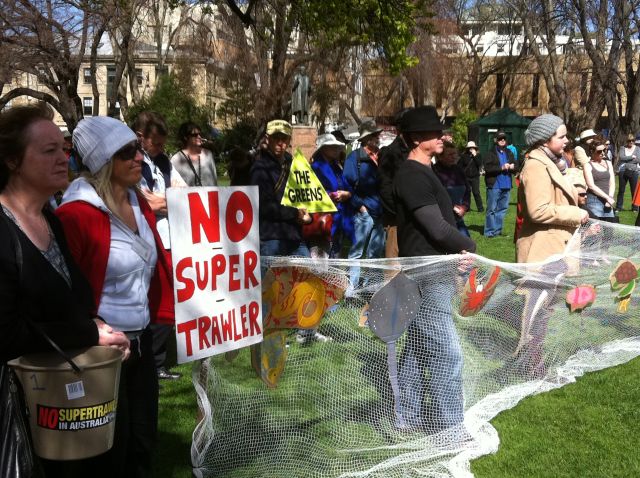
The Australian government has bowed to public pressure and banned the supertrawler from operating in Australian waters for two years. During this time more scientific research will be completed into the effects the supertrawler would have on local fish stocks.
The supertrawler, known as the Margiris before changing its name to the Abel Tasman, is the world's second-largest trawler and would have been the largest ship ever to fish in Australian waters. The 142-metre-long ship had a quota of 18,000 tonnes, which it would have caught with its 300-metre-long net.
Commercial and recreational fishers joined environmentalists to oppose the ship operating in Australia because of the impact it would have had on the marine ecosystem.
The supertrawler is a factory on a ship. Although there are other fishing ships with larger nets operating in Australia, Abel Tasman can stay out at sea for months at a time. As soon as fish are caught they are immediately processed and frozen. The reason the ship is so large is to accommodate factory and freezer sections onboard.
This capacity to stay at sea and fish in one area for a long time has led to concerns that fish could become depleted in localised areas.
The Australian Fisheries Management Authority website says, "Smaller vessels without at-sea processing and freezer capacity need to constantly return to port which increases fuel costs, reduces fishing time, affects product quality and also reduces their fishing range.”
The Abel Tasman was targeting redbait and jack mackerel to export to west Africa for human consumption. These species are important, says Environment Tasmania, because, “they are food for a wide range of predator species, including bottlenose dolphins, Australian fur seals and other marine mammals, sea birds, and larger fish such as southern bluefin tuna and sharks.”
If there is a severe reduction in the number of smaller fish, it will affect the food chain for larger fish.
Another big concern is the impossibility for the supertrawler to catch only the species it is targeting. Its large nets catch everything in its path, which could include dolphins, seals, birds and sea lions. Known as bycatch, these other species are simply discarded after being killed in the nets.
After a public campaign by environment and fishing groups, including two rallies in Hobart, a national petition with 94,000 signatories, and a unanimous motion by the Tasmanian parliament opposing the ship, the federal government responded by announcing stricter controls, including video cameras that would record bycatch and monitors on board at all times.
But that was not enough to quell opposition. Before long, fisheries minister Joe Ludwig and environment minister Tony Burke took action to change the laws.
In Burke's words: “The law didn't allow me to, so we're changing the law.”
Those opposed to the supertrawler are keenly aware of the crisis caused by overfishing in other parts of the world, and do not want to see Australia follow suit. Professor Jessica Meeuwig from University of Western Australia says: “The world’s fishes are at a fraction of their natural abundances. We are basically mining the oceans of fish. The move to supertrawler fishing is symptomatic of this.”
One billion people around the world rely on fish as an essential part of their diet, but due to the rise of industrial-scale fishing, many species of fish have declined to the point of near extinction.
Parts of Australia’s oceans are nowvery lightly fished because it is unprofitable for smaller boats to operate. But supertrawlers like the Abel Tasman are able to work in previously unfished waters. Under the logic of capitalism it is in the interests of these ships to catch as much as they can, using sonar technology to pinpoint exactly where the fish are.
Fishing quotas set by governments are over-allocated or ignored, leading to severe consequences such as the complete collapse of entire fishing industries and poverty for communities who rely on fish to survive.
One example is Newfoundland, Canada, which was once renowned for its thriving cod industry. But the volume of cod caught by factory trawlers — 100 years' worth of cod in just 15 years — caused numbers to plummet. In 1992, the government placed a moratorium on fishing cod and the entire industry collapsed, with the loss of 40,000 jobs. Fish numbers have not recovered even 20 years later.
Another example is the rise of piracy in Somalia. One cause of people turning to piracy was the encroachment by illegal foreign trawlers on the territory of local fisherman. An article by the Guardian in April this year quoted a Somali fisherman from 2006: "They are not only taking and robbing us of our fish, but they are also trying to stop us from fishing. It is now normal to see them on a daily basis, a few miles off our shores. They destroy our nets and they take our fish. They regularly come inshore at night. If nothing is done about them, there soon won't be much fish left in our coastal waters."
In desperation at the loss of their livelihoods, the fishermen began to attack the trawlers.
Australia previously banned another supertrawler, the Veronica, in 2005. Other countries in South America and Africa have banned trawler fishing in their waters altogether.
Laying the blame on consumers for eating fish, either in Australia or in West Africa, is wrong and will not stop the operation of factory ships. Measures such as better regulation of the fishing industry and more marine reserves will help, but essentially people need to be allowed democratic control over their food supply, and prevent the activities of corporations who threaten that.